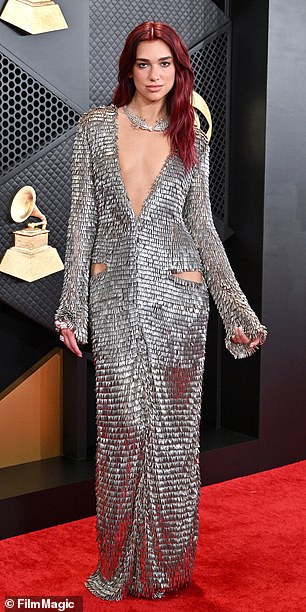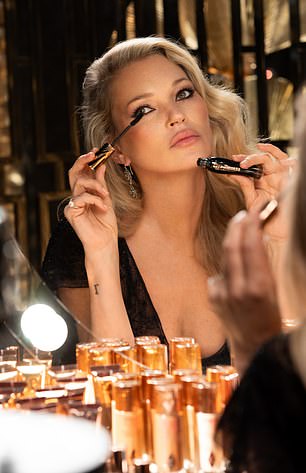Table of Contents
Famous face: Kate Moss in a Charlotte Tilbury advert
There is an observation, known as the lipstick index, which says that when times get tough, women treat themselves to a lipstick.
But does the recent drop in sales of lipsticks and other cosmetics and creams refute this once-trusted theory?
That’s the question investors are asking themselves as the crisis hits the stocks of beauty industry powerhouses such as Estee Lauder and Shiseido.
But the world’s best-known fund manager is not among the skeptics.
Warren Buffett, chief executive of the £775bn Berkshire Hathaway fund, has just bought a stake in Ulta Beauty, one of the biggest names in the US hair and make-up sector.
Buffett is evidently convinced that Ulta stock is a bargain.
Because beauty hasn’t gone out of style, it’s just changing.
There are signs that the concept of “consciousness” is taking a step back. Brands have been reluctant to use the phrase “anti-aging” in favor of terms like “renewal.” But Gen Z 20-somethings don’t like such euphemisms.
They prefer to be open about seeking solutions to incipient wrinkles, just in case they live as long as Buffett, who celebrated his 94th birthday last month.
In skincare, for example, there is a new emphasis on dermatology, with moisturizers and serums being marketed more as pharmaceutical products than as simple lotions. In addition, consumers are using much more perfume, and the scent of success surrounds high-end scents.
Meanwhile, sales are not weak everywhere. In Britain, the clamour for lipstick and other products has not abated. The British market, the fifth largest in the world, is worth 27.2 billion pounds, according to global forecasting consultancy Oxford Economics.
If Buffett’s intervention has you considering a portfolio facelift, here are some of the names that could bring some shine to your portfolio.
Estée Lauder
The problems of the £33.2bn US beauty empire Estée Lauder are due to an over-reliance on the lipstick index, coined in 2001 by Leonard Lauder, then chairman of the group created by his mother in 1946.
The company appears to have assumed that Chinese customers, who account for a third of sales, would not be deterred by factors such as high youth unemployment and the crisis in the property sector in their country.
Estée Lauder was also slow to promote its brands (such as Bobbi Brown, Clinique, Le Labo, Mac and Tom Ford) on Tik Tok and other social media platforms.
And it was a somewhat protracted transition from fading department stores to outlets like Sephora, the chic retail division of luxury giant LVMH.
As a result, the stock has fallen 73 percent to $92 over the past year, posing a considerable problem for Chief Executive Fabrizio Freda and whoever succeeds him when he steps down next year.
Such are the challenges that most analysts rate the stock as “hold”. However, David Coombs of wealth manager Rathbones is more confident, arguing that “any recovery in China should result in a decent rebound”.
She adds that Estee Lauder now sells more through Amazon, which is increasingly a force in the beauty market.
L’Oréal
L’Oréal, the £180bn French giant, is the world’s number one in beauty.
Under Nicolas Hieronimus, the group appears not only to have weathered the Chinese crisis better than Estée Lauder, but also to have expanded its presence in the dermatological sector with its Cerave and SkinCeuticals brands. In this lucrative sector, it recently acquired a stake in Galderma, which supplies “injections” (Botox).

Hitting the nail on the head: YSL has produced fragrances such as Libre, endorsed by Dua Lipa
L’Oréal owns Garnier and Maybelline. It is also a major player in the “prestige” beauty sector through brands such as Aesop, Lancome and Kiehl’s.
Spending on these more expensive offerings has slowed amid broader weakness in the luxury sector that has hit shares of Burberry and others.
This drop in sales may be a return to normality after the frenzied revenge buying of the post-pandemic years.
But some analysts say the current narrative is too negative, especially since L’Oréal is one of the so-called “Granolas” – European stocks favoured by US banks looking for bargains and long-term quality. L’Oréal shares are trading at €383, but analysts at the Bernstein brokerage have set a target price of €490.
Part of this confidence may be down to L’Oréal’s push into perfumes. Long-term deals with couture houses such as YSL have led to fragrances such as Libre, endorsed by singer Dua Lipa. Fragrances are at the centre of a boom. Barclays estimates that global sales have risen to £49bn, around 40% above their pre-pandemic level.
Moreover, perfume lovers are no longer loyal to a single scent, but have numerous bottles.
This is also proving to be good news for Puig, the Spanish beauty group whose fragrance range includes Paco Rabanne and Jean Paul Gaultier. As results published yesterday show, the appeal of perfumes and skincare products is offsetting lower sales in Asia.
Shares in Puig, which has a majority stake in beauty business Charlotte Tilbury, went public in May and are rated “buy” by most analysts.
Ulta
The £12.8bn chain, which has 1,385 stores across the US, faces increased competition from Sephora, but also Amazon.
The development, revealed in the company’s second-quarter results, came as a surprise to investors following Ulta’s rapid growth in recent years.
Shares have fallen 27 percent to $358 since the start of the year but are up 10 percent in the past month, suggesting the downturn is seen more as a stumble than a long-term trend.
Buffett’s share purchase is also seen as a sign of faith in the recovery, especially as he made clear that Berkshire Hathaway’s £144bn cash pile will only be committed to something that has “very little risk and can make us a lot of money”.
The average analyst target price for the stock is $405.
Shiseido
The stylish products of Shiseido, a Japanese group, used to be highly sought after in China.
But the Chinese are now less interested, and the shares have fallen 27 percent this year to 3,094 yen.
Most analysts, however, still rate the stock “buy” because Shiseido has some of the same trendy brands like Drunk Elephant that delight the growing “tween” clientele. These are the 10- to 12-year-old consumers who crowd the aisles of Sephora, armed with knowledge about their favorite blushes, potions and mascaras and the cash to buy them. These consumers have helped turn singer Selena Gomez into a billionaire with her makeup brand Rare Beauty. Analysts have lowered their price targets for Shiseido, but still rate the stock “buy.”
Elf
Elf, which stands for eyes, lips and face, is famous for its low-cost products and the trajectory of its stock price, which has increased by 708 percent in the past five years.
But stocks have been negatively affected by Donald Trump’s threat, if elected president, to impose tariffs on US goods imported from China.
This is the primary source for Elf’s lipsticks, eyeliners, and other essential products that feel and look like more expensive products.
Most analysts rate the stock a “buy,” viewing the drop as an opportunity to profit from Elf’s innovation and its appeal to budget-conscious beauty lovers.
London war paint
This AIM-listed company is the British equivalent of Elf, offering this look for much less. A lot less, as fans of its W7 range will attest. Investors are fans too: shares are up 959 per cent in five years to 546p.
But analysts believe there is still a long way to go and have set an average target price of 590p.
DIY INVESTMENT PLATFORMS

AJ Bell

AJ Bell
Easy investment and ready-to-use portfolios

Hargreaves Lansdown

Hargreaves Lansdown
Free investment ideas and fund trading

interactive investor

interactive investor
Flat rate investing from £4.99 per month

Saxo

Saxo
Get £200 back in trading commissions

Trade 212

Trade 212
Free treatment and no commissions per account
Affiliate links: If you purchase a product This is Money may earn a commission. These offers are chosen by our editorial team as we believe they are worth highlighting. This does not affect our editorial independence.
Some links in this article may be affiliate links. If you click on them we may earn a small commission. This helps us fund This Is Money and keep it free to use. We do not write articles to promote products. We do not allow any commercial relationships to affect our editorial independence.

